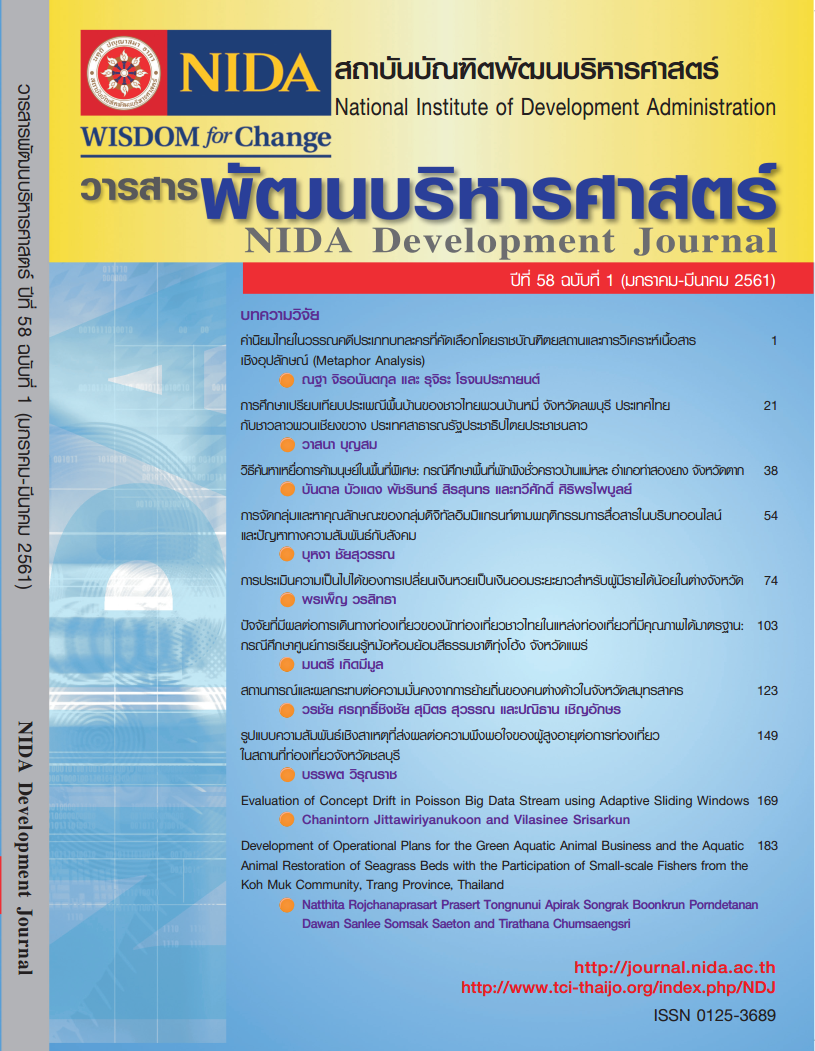A Comparative Study of Thai Phuan Folk Tradition in Ban Mi, Lopburi Province, Thailand and Loa Phuan in Chiang Khwang, People’s Republic of Loa
Keywords:
folk-Tradition, Thai Phuan in Ban Mi, Loa Phuan in Chiang KhuangAbstract
Abstract
This paper examined the general context and conducted the comparatiive study of local traditions between of Thai Phuan in Amphor Ban Mi, Lopburi Province, Thailand and those of Loa Phuan in Chiang Khwang, Loa People’s Democratic Republic. Data were collected by observation and in-depth interview. Together with pictures on videotape record Data were analyzed using content analysis. The results of the research have revealed that people of the two areas speak the name Phaun language which protects their identity, However, their geography, history, politics, and economy are diffirent. Chiang Khwang is located in mountainous region and ruled by socialism, while Ban Mi is located on flat, low-lying land and ruled by capitalism. Both of them try their best to restore and conserve their traditions and rituals. Loa Phuan in Chiang khwang have adjusted some rituals in order to create harmony with Loa culture. Even though people of the two areas have different background, they have created strong communities through their traditional rituals. They have strong faith in their rituals bringing their happiness, prosperity, peace, well-being, and unity.
References
for Local Products and Tourism in the Central Region: Dimensional Relationships between Nostalgic Phenomena and Creative Economics”. Journal of Arts. 42(2): 103-132.
Na Talang, Siraphorn. (Ed.). (2013, July – December). “Creative Folklores,” Journal of Arts
42(2): 1-74.
Nohkham, Chao Khamluang. (2012). The History of Phuan City. Bangkok: Ruen Kaew Publishing.
Phuan Society of Thailand. (2014). Reports of Thai Phuan Activities in the year of 2014: N.p.
Sathienkoseth. (2003). Miscellaneous Traditions. Bangkok: Siam Publishing.
Udomsin, Warawan. (2005). A Critical Study of Thai Puan Jataska Fables of Ban Muang Khao, Tumbon Khokpeeb, Amphur Si Mahosot, Prachinburi Province. Unpublished Master thesis, Department of Thai Language, Srinakharinwirot University.
Wanliphodom, Seesak. (2000). Unorthodox Outlook: Cultural Society in the Conservation Path. Bangkok: Mueng Boran Publishing.
Wongthed, Sujit. (Ed.). (2001). Poetry of Muang Phuan . Wiang-Jan: Department of Loa Language-Literature, Faculty of Arts, National University of Loas. (NUOL).
Conversation of the Elders of Lao Phuan, Chieng Khwang. (2014, May 28th). An Interview.
Joomthong, Somkhit. (2014, May 4th). The Creator of Thai Phuan Museum, Ban Sai. An Interview.
Lainamngeun, Phairote. (2014). The Creator of Thai Phuan Museum, Ban Phon Thong. An Interview.
Phathrachai, Sukanya. (2014, December 18th). Former Director of Folklore Center, Faculty of Arts, Chulalongkorn University. An Interview.
Sansathit, Sawang. (2014, April 22nd). The Party of The Ministry of Foreign Affairs, The Lao People's Democratic Republic. An Interview.
Sukhanthawiphat, Chinnabun. (2014, August 24th). The Leaders of Ban Hin Pak Yai Community. An Interview.





